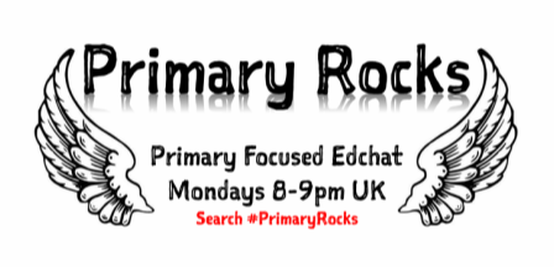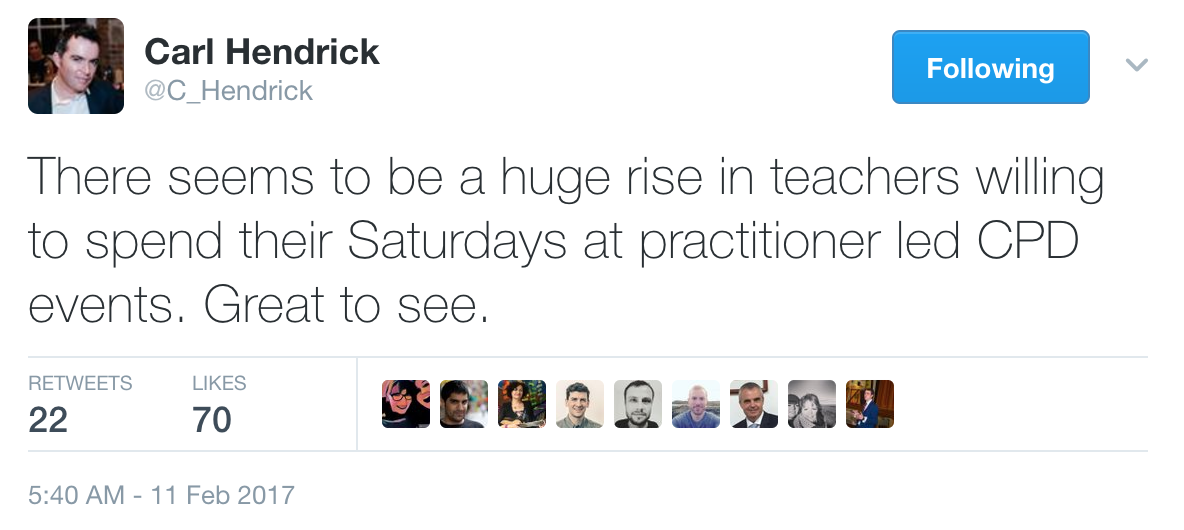|
Work was painted by Ford Madox Brown between 1852 and 1865 and is a great painting to use as part of a project on the Victorians.
What could you do with it:
These are only 5 simple ideas that could extend out. There is a half terms worth of work which could be done centred around this painting and there are so many paintings which offer similar opportunities. So lets get art and paintings back into our classrooms. Sophie Merrill @MissSMerrill
3 Comments
Question 4 of #PrimaryRocks on Monday 20th March looked at how to build resilience in children. To begin with, I think it is important to define the term resilience:
Resilience: an ability to recover from or adjust easily to misfortune or change. This is a quality that everybody needs but also a quality that is very difficult to build. In this way it is very similar to go-karting: push too far or drive too close to the limit and you tip over the edge; don’t push far enough and you always stay in your comfort zone not making as much progress as you could. The ideal is finding that Goldilocks sweet spot. Some parents do not like their child to be pushed out of their comfort zone and they try to protect their child from all things bad. However, this is setting their children up for a grand fall later in life. Life is hard. We are introduced into the world and the first thing we experience is having our skulls squashed in order to travel the birth canal. We come out crying and but most of us turn out OK in the end! Parents and schools cannot shield children from harm all of their lives and so we should develop their resilience. A lot of this resilience should be taking place in the home but here are some ideas that can help build resilience in your school:
We need to think more like Iain Dowie, the ex-footballer and ex-manager, who coined the word bouncebackability to describe his team’s performance. That’s what we need to instil in our children and, just as importantly, develop in ourselves. Thanks to all those who take part in #PrimaryRocks each Monday from 8pm on Twitter. @gazneedle Recently the subject of libraries in Primary Schools has been discussed on Twitter. Rob asked the question: Does your primary school have a fully functioning library? The results were varied. Almost a quarter of the votes indicated no library at all, whilst 30% could only describe a room with books in.
https://twitter.com/redgierob/status/833960164059398148 With the challenges of ever decreasing budgets year on year, many schools are feeling the need to put libraries on the back burner. As a school’s current stock wears out, where does the money come from to re-stock? How can a school manage a library when staff for interventions are hard to come by? This was a challenge faced by my school – solved through creative staffing and accessing nationally available grant schemes. On first entering my new school I was greeted with an impressive space. Windows all the way around, a library of sorts. Originally the space was the connecting area between the Infant and Junior departments. After the initial first impression of space, it became clear that this area was wasted. There was no clear purpose to it. A brick “bench” resembling a bus stop had been built in the middle of the area, giving it a Doctor’s waiting room feel. There was work to be done. Many of the books were tired – publication dates identifying them as older than most of the staff. As a school, we couldn’t allocate enough funding to refit the library as we wanted to – and we didn’t want a half-done job. I began to investigate alternative funding options, and after an open question on Twitter, found the Foyle’s Foundation (I think thanks for this go to @LibWithAttitude) http://www.foylefoundation.org.uk/how-to-apply/state-schools.php The process was fairly simple. Within the application form I highlighted our challenging social circumstances, using quotes from the School Development Plan as well as percentages of Pupil Premium students and EAL. I also used quotes from our most recent inspection reports to show that reading was a priority. Another important factor in the application process was how the library would be sustained. We have an enthusiastic PTFA who have donated furniture for the library. Part of the process also required us to indicate how the library could benefit the wider community. To support this a member of staff opens the library after school once a week for families to loan books. The shopping list was the most exciting part – Madeleine Lindley were fantastic. I gave them my budget and they built a library for me! After a wait of several months, we heard that we had been successful. To prepare for our new resources, we invested in the structure of the library. This involved getting our caretaker on side to remove seating, and tasking a lunch time organiser to paint a mural. We had an official opening which we invited parents to. We wanted a community ownership feel from the start. We are all now proud of our new library. The children have bought into it, and want to look after the resources. We have too many children wanting to be librarians and have to have a waiting list. The entrance to our school is now impressive and purposeful – thanks to a grant from the Foyle’s Foundation and the hard work of our school staff. https://twitter.com/goodman_ang/status/834119929897033728 Blog by Angela Goodman @goodman_ang All children should be given equal chances to do the best that they can in our classes - agreed. This is why teachers are often asked to focus on key groups (depending on schools, their cohorts and their latest Ofsted reports).
Indeed, eliminating the well documented learning gap goes to the heart of why some of us decide to work in the school in which we do. There can be little argument that there is a moral purpose behind helping those classified as Pupil Premium. This group is one that my school are currently focussed upon as it is clear that their progress in writing is less than that of non-PP and they are a group who generally might not have the same exposure to experiences outside of school. This group have a complex range of needs and are a mixed ability group of learners but, with a few simple adaptations and some not-so-simple-but-worth-it ideas, children who are at a disadvantage in life will be catered for as equally as others. I'd like to add, that I'm not a big fan of grouping children, but actually when it comes to analysing data and providing the best learning we can for all children, I believe it is vital to be aware of these categories and the patterns that may exist. Equally, I have children who are not technically 'pupil premium' and won't be because of a matter of pennies earned by their working-four-jobs parents. These children fall into the same learning gap as our PP children in many areas, some in fact more so. Due to this issue with the grouping system, I have a slightly larger unofficial 'PP group' as I include these peripheral pupils in each of the following: Feedback first I stole this from a secondary colleague as it just makes sense: Top of the pile/first in your queue (however you give feedback is fine by me), you're fresh as a daisy, feedback will be clear and these books will be first to be handed out so they have most time to edit and improve their writing. Peer pair They have a buddy who is not necessarily the person they sit next to, with whom they can go to for help with ideas at the beginning and when editing throughout. Lack of ideas can be a real mental block for anyone. When writing a narrative for example, lack of exposure to different plot lines from which to inspire their own story is a hindrance. Thus they go to their buddy with their story mountain to discuss what could happen and if their idea makes sense. Parent partnership There are easy ways to ensure parents are involved with school. For some, this isn't a problem PP or no PP. There are things we do as a school: newsletters, assemblies and parents evenings. When these aren't being used by PP parents they need tweaked. How does parental engagement help children's writing you ask? Well, their parents become more interested generally. Why would the children want their writing photographed for the blog if no-one was looking at it? Why would the children enter the competition to design the disco poster if they knew they wouldn't be going? Why would the children want to write something for the class assembly if their parents can never go? Why would they work their hardest if their parents have no contact with us to find this out? Here are a couple of simple fixes: 1. Parents have reminders about parents evenings: blog, messages, at the door, in the school bag. 2. Parents evening slots are created/juggled/extended - often we aren't in their working hours. Meeting over the phone is not unusual and I’ve recently done this during the mum's break at the hospital. 3. Videos and pictures of children during class assemblies 4. Pictures of newsletters and letters so they actually get home (4.5. Getting parents in to help set up email while colleague plays with 4 kids, so all letters are emailed so can't get lost and why not Class Dojo while you’re at it?!) 5. Free non-uniform day ideas sent to all parents via Class Dojo (notifications on phone) 6. Simple messages home about getting eyes tested, changing their lunches or even reminders about discos. Teacher time There are little slots in the day when I make sure I see all PP children: // At the door in the morning, after break and after lunch: this is for all children, but essential to welcome them back into our space leaving everything else at the door ready to learn. // Preliminary mini plenaries: During any writing, I'll gather these children and we'll then have a look at a couple under the visualiser to assess together. This small group has had expectations modelled again and can go and edit and continue writing knowing they're on track. // After lunch, during handwriting, I will ensure I go and look at each of theirs and have a little tête-à-tête about what and how they're writing. Experiences I have just finished the co-planning of a 6 week writing project for the PP pupils (including our peripheral PP) across the year group. It's a lesson a week, but requires daily writing in their very own special book. It involves collaboration with a high school in Brighton and their Y8/11 pupils using us as a revision and pupil-leadership programme. Each week there will be communication between the two sets of pupils, including a field trip one week. This communication and the learning that comes from it will be the inspiration and encouragement for writing for a variety of purposes. Not only that, but their audience will widen to older children and their teachers as well as the unknown audience of a geocache. If there were a learning goal, it would be 'to develop an enthusiasm for writing through a series of collaborative geography focussed lessons'. Updates will be available just before Easter hols! Keeping these PP children at the back of our minds ensures they don't get lost in the day to day hubbub and get opportunities similar to their peers. Indeed, if we don’t accelerate the learning of these pupils; give them the cultural capital that they will need in order to negotiate secondary school and address their deficiencies in writing, reading and maths, who will? We could leave it for the next year group/key stage/ school to worry about, or we could nip it in the bud now. By Leah Sharp @Leah_Moo The need for children to develop an advanced vocabulary was brought into stark focus in May last year, when the new KS2 assessment for reading was unleashed on the nation's children. In it, the children were required to read a text suggested to be aimed at 14/15 year olds as well as answering questions on it. Children were reduced to tears and the national pass rate plummeted. Reading was no longer a 'soft' subject where you chatted with a group for a week about a book, it was a serious academic discipline once again. To pass, children would have to read quickly and accurately as well as be able to comprehend complex vocabulary on a level not required before. The question is: we know how to teach decoding, but how can we help children develop a greater vocabulary?
I've a few ideas, (this is by no means a comprehensive list): 1. Promote a love of decent books Put simply, if your child doesn't read outside of school, this standard is likely to be well out of their reach. Not only that, but unless the stuff they read is of a sufficient quality, they still won't pass. You need to place value on reading. You need to promote books that are at age related standards. No more Jacqueline Wilson in year 5, no more Diary of a Wimpy Kid, but Narnia, Hunger Games, Alex Ryder and Harry Potter. Its not good enough anymore to simply check reading diaries to see who is reading, what they are reading is important. Don't allow comics in class, don't allow e-books or soft touches, set the standard high and keep it there. If you don't do it, no one else will. Take the kids to the library, give them recommendations on what to read next, read complex texts to them out loud. There are millions of amazing books out there, kids just need to be exposed to them. In my experience, children want to do well, so will try these books, pick the right one and they are away. If your kids don't love reading because they cant find what to read, you need to do something about it. 2. Normalise complex vocabulary I'll always remember when I was an NQT I was given feedback that said (paraphrased) "the words you use are too long, the children don't understand what you are saying." Talk about low expectations. They did, because I deliberately use different vocabulary to what they children hear at home and when I do it I explain what I am saying. It's like using the word 'upset'. When I first said to my class that they had been upset by the fact it was raining at breaktime, they replied 'no we weren't'. This is because they understood the word upset as meaning sad. When I explained that it also meant to knock someone out of their normal way of doing things, they got it. Now I can use it all the time and they get what I mean. Same with the word 'plausible' - "does anyone have a plausible explanation as to why I have highlighted the words in this paragraph?" Its about presenting new vocabulary in a careful way, clarifying meaning as you go along. 3. Model decoding unknown words for meaning Have you ever learned a new word and then suddenly it appears everywhere? This happens to me all the time and I'm assuming its because before I understood the meaning properly I was simply skipping over words I didn't know. This is a bad habit for children to get into, especially with the specific vocabulary questions that appear on the KS2 tests. If you read out loud to your class (which you should), you've got a great opportunity to model how to decode and understand complex vocabulary. Children should have been explicitly taught the strategies of reading around a word, substituting another of it to see if the sentence works, stripping a word to its root and working out the meaning from there and so on. If you do this every day, you will find these strategies are embedded and children know what to do when meet a word they cannot understand. 4. Use kids as an agent to improve reading In my class we do 'real reading and fake reading'. The kids read for 10-15 minutes in silence and then I randomly pick 10-15 kids and get them to tell everyone about what they have read. This enables them to hook others into the story they are reading and recommend books to their peers. It also enables me to ask them what other books are like the story they are reading. This helps children to move between authors and books they like. I've lost count of the number of times when a child had given a glowing summary of a book they had read and people asked them "Can I have that after you?". That's what you want. 5. Know your authors and don't neglect the classics I have this recurring nightmare that this year's KS2 SATS paper will have an extract from Wuthering Heights in it.In it, all the children cry at the archaic language and get zero. To assuage this worry and to help my kids graduate to the great texts of English (language) literature, I often read old texts out load to my class. For me, Enid Blyton is your best friend as a primary teacher, because she does two things: 1. uses loads of words the kids wont understand but more importantly, 2. her stories are absolutely amazing and hook all ages of children. The added bonus is that you can go into any charity shop and buy an Enid Blyton book for less than a quid. In 'Reading Reconsidered' Doug Lemov (to me) suggests that unless you've read archaic literature to your kids from the start of school, they have no hope to start reading things like Thomas Hardy or whatever when they are teenagers. There is a clear continuum from Peter Rabbit, to the Faraway Tree, to Narnia, to whatever. Whether people like to admit it or not, there has been a definite dumbing down of language in modern books for children under 6. How many children's books these days use the word soporific? It's in Peter Rabbit. If books stopped being published tomorrow, no child alive would be bereft of brilliant books to read, remember this while you look for the next great children's author or a snazzy interesting cover. Sell the content, not the design. I hope some of these ideas help - get in touch with me on @farrowmr or ask a question for discussion on #primaryrocks chat - Mondays from 8-9. Managing behaviour is more than crowd control and the term behaviour management almost suggests managing/controlling those ‘key characters’ that we have all met throughout our careers. Those kids that see you as you walk through the door keen and eager to make an impact on your new class; meanwhile they are just thinking – yay, fresh meat!
For me behaviour management isn’t about what you do when Bobby decides to kick off because someone looked at him, or how you calm Stacey down from the endless arguments she has been having with the other children in the year group. It’s about setting out your stall. Setting up an environment that allows all children to be safe and flourish in their learning. So what is my advice? 1. Be consistent – follow through with what you say. If you say the children will stay in at break if work is not completed – do it! The moment the children see a chink in the armour that’s it – you are done for! 2. Know your children. Know what makes them tick. Set up the classroom to avoid issues where consequences are needed. If you know that Ahmed and Tom are best mates and make each other giddy as kippers, sitting them together is probably a bad idea. Think about having carpet places and arrange your seating plan so that certain children are not in eye line of each other. Also think who needs to be at the back – no one to turn around and distract. 3. Make children invested in the classroom and learning. Think about rewards that they will want to earn. First of all, tap into what they want to learn. Make them so interested in the theme/ topic they are working on that being off task won’t be an issue. Secondly think about what your children will want as a reward. I heard Sue Cowley speak about this at Northern Rocks last year and she is spot on. Not every child will want a reward of going out for basketball or lego time. Don’t force what you want/think is easy to facilitate. 4. Never underestimate the power of a phone call or text message home. They can mean the world.Parent power is the best tool in a teacher’s kit. If you have a good relationship with the parents you have already won half the battle. 5. Surprise rewards. Treating them when they don’t expect it. Not as a carrot but just because. It shows you care. I have done this many times. I know this goes against the healthy schools thing but one of my favourite things to do involve a pack of custard creams. The children would be working away and I would out of the blue offer a biscuit to each child totally at random. Who doesn’t love a custard cream?! 6. Use humour to defuse situations – this is invaluable especially in year 6. Never underestimate the power of banter. Again – this ties in to knowing your children. Sometimes a joke or a quiet word will get a child back on track far more effectively that the hair dryer treatment. 7. Have high expectations – don’t lower them. Set things in place when expectations are or are not met. Don’t be afraid to show you mean business. If the children are not producing enough work/complete work to standard, hold them accountable - whether it’s a chat with parents or keeping them in to rectify this. 8. Change systems if needed. Don’t set children up to fail. Make the system fit the child not the child fit the system. Don’t be afraid to set up individualised plans for those children that the system doesn’t work for. There might be any number of reasons for this but by continuing to make them fit the system we are setting them up to fail. Think about smart simple achievable targets. Involving the child in this is key. They have to understand how they can correct their behaviour and should be involved in choosing their incentive for doing so. This will also need reviewing on regular occasions. 9. Don’t squash big personalities Get them to work with you rather than against. I must admit I am one of those teachers that love a big personality; they often bring humour and those magic moments to the classroom that you remember for the rest of your career. Go with the personality rather than try to stifle it. 10. Quiet reading/guided reading straight after lunch defuses lunchtime issues.We all know that you can have a lovely calm focused class out for lunch and then pick up a class that are swinging from the light fittings after an hour running around outside, arguing over who fouled who in football or whose turn it is to play hockey and that’s before we have even mentioned the year 6 constant falling out and bickering that goes on. Setting up guided reading as soon as they come in defuses any lunch time issues. It calms things down and resets the tone for learning. I am aware that this may have an element of teaching some to suck eggs. I am also aware that how you manage your classroom is very personal and not everyone will agree with my approach. Let’s also not forget, what works for one teacher might not work for another. This is more me expanding on some of my tweets last night and being reflective on my own practice, after all if we don’t do this how do we grow professionally? Which is why chats like #PrimaryRocks are so great. They build communities. Communities where we can share, reflect and discuss everyday efforts in our classrooms. Sophie Merrill @MissSMerrill We are greater than the sum of our parts!
It has been my absolute honour to connect with so many talented teachers via twitter and especially the PrimaryRocks community. What started as a few teachers having a chat on a Monday night about superheroes and the like has metamorphosed into something of a grassroots movement for primary teaching. PrimaryRocks is not alone in this, with lots of other hashtags bringing together like-minded teachers. Where PrimaryRocks differs is it gives ordinary teachers a voice. Those of use at the metaphorical chalk face, the ones struggling to make sense of the new assessment regimes post the abandonment of levels, the ones bringing the new curriculum to life while maintaining standards. It doesn’t matter if you are a Head, SLT teacher or even a trainee, your voice and opinions are as valid and treated with the same respect. To not put too fine a point on it we have governors and teaching assistants who join us. Anyone with an interest in Education is welcome. Although we are a predominantly primary focussed group, the contributions of secondary, SEND, HE and FE educators provide a vital insight into the needs of our pupils now and in the future. As the title of the blog suggests we ARE greater than the sim of our parts. That is not to diminish from the staggering talents of the community. Together we are able to make in impact and influence. Don’t believe me? Well last year at the conference we had Lucy Powell the former shadow Education secretary. She came and spoke to the delegates. This year we have Sean Harford, the Chief Ofsted inspector for schools and myth-buster general. TES are beginning to run blogs and articles about some of the issues raised during the Monday night chats. During a recent visit to the BETT show, I sneakily replaced the free lanyard for my one from PrimaryRocks live last year. So many of the people and companies I spoke with over the weekend spotted it. I was staggered at how far this small grassroots idea had spread. As a community we have never sought to self-promote. We like to speak through our Ethos and actions. We just want to do a good job and help our children to learn. As our charter says, “We bleed Education! This is our true passion.” We are first and foremost, Educators. The chat allows us to innovate and share exciting practice. Through the chat and we are able to access high quality CPD much quicker and cheaper than established routes. Are we out to subvert Education? Absolutely not, but does it mean we are going to allow it to stand still because “we have always done it that way”? The answer simply is NO. We don’t always agree as a community and healthy debate helps us to question our own practice and expectations. One thing I have always loved about PrimaryRocks is the lack of a pack mentality. Every point is valid even if it is different to your own. We Learn obsessively and share relentlessly. None of us are the finished package, even as heads and consultants. There is always something new to learn. This for me is why we are greater than the sum of our parts. As individuals, we are good, but as a community, WE ROCK! Tim Head @MrHeadComputing A few days ago I saw this tweet by @C_Hendrick and nodded in agreement. I have seen many more of these events occurring recently, I get asked to speak at them and I am a small cog in the fantastic team of primary practitioners who organise Primary Rocks Live. I am the only one who is not full time school based. Why so many negatives floating on the sea of positivity? What has prompted me to write this blog is the negative thoughts many tweeters expressed around the concept of Saturday CPD. I won’t lift tweets and place them here but there were a number of issues raised amongst the raft of positivity:
I do not think there is an expectation for any staff to attend Saturday CPD sessions, it would be a different matter if SLT were placing this expectation on teachers. Some schools pay for Saturday CPD tickets and days in lieu if a teacher requests to attend and it is beneficial to the school or teacher. Why is there a need at all for Saturday CPD? Most schools have five INSeT days per year in addition to staff meetings and attendance at external CPD events so why is there a need for Saturday CPD events such as #ResearchED, Pedagoo and #PrimaryRocks Live? I think the answer is pretty simple – they offer something different. Most school CPD is booked by SLT who have an overview of the whole school, they assess any weaknesses and needs of the school staff. (accuracy of this assessment could be argued here). They then source CPD based upon these needs. One teacher recently told me on Facebook that they have asked to come on a Literacy Shed CPD course but have been told that the only CPD being sanctioned this year is maths CPD because this is high on the list of priorities for the school. You can see why this occurs if budgets are tight. If Maths and English are taking priority in a budget that is already being squeezed where will PE, Art and RE training it in terms of priority. This is the big difference between CPD that is chargeable and takes place during the week and Saturday CPD. Saturday CPD often deals with the wants of the teacher rather than the needs of the school. Personally my interests lie in English and PE, I lap up all modern developments and theories out there on these subjects. Truthfully, maths CPD, science CPD and behaviour training do not appeal to me, if I was in school where this was seen as a weakness then I would attend and take notice but I would be unlikely to seek it out otherwise. However, I want to find out more about the teaching of English, I want to see how it is done in other schools and how teachers are delivering it and I want to hear from academics in the field. This is where Saturday events come into their own, I can pick and choose which I would like to attend and who I would like to listen to whilst I am there – I can spend a whole day of CPD without anyone mentioning the ‘bar method’. The only bar method I’ll see on Saturday CPD days is the pulling of pints at the end of the afternoon. This is not the only difference between ‘traditional’ in school CPD and Saturday CPD. I have seen a number of fantastic speakers at these events, Hywel Roberts, David Didau and Jon Brunskill to name a few, speakers that schools could simply not afford to pay all staff to see in the same amount of time (especially when school CPD budgets are around 0.5% of their total budget.) I have seen these speakers talk for around 30 – 60 mins each time, Saturday events are like the tasting menu at a Michelin Star restaurant, you get little samples of wonderful tasty morsels which leave you wanting more. It is because of this that Saturday CPD is relatively cheaper than the traditional school CPD ‘Saturday speakers’ tend to speak for free or a reduced price. I deliver CPD in schools weekly but I speak at Saturday events and teachmeets for free when they are non-profit making events because I want to be able to share with those teachers who do not get the opportunity through school. Often speakers at these events, such as #PrimaryRocks Live, are full time classroom teachers who are not able to take time out of class to offer their experiences to others. It doesn't happen in other professions though so teachers shouldn't have to! One argument I saw repeated on twitter this week. Try this – type ‘Saturday CPD’ into google. A whole myriad of results appears. If you are an accountant it seems you can attend an ACCA course on pretty much any Saturday in the year, Dental nurses in Reading can top up their knowledge this Saturday. In Liverpool on the 6th of May you can attend the ‘Exotic Pets in General Practice’ CPD course (if you are a vet.) You could brush up on your counselling in Brighton this Saturday or choose from a range of massage courses to do in Kent. And it is not just in the UK, if you are a barrister in New South Wales their Bar association offers official accreditation for barristers attending two or more Saturday courses in 2016/17 As for burning out, please take my advice, if everything is getting too much for you then take Saturdays to relax and spend time with your family and friends. Or come along to a Saturday CPD event and make new friends. Saturday events are designed so you can take in as much or as little as you like. I have missed whole workshops because I have been sitting and chatting with like minded people in the refreshment area. I count some of the Primary Rocks team amongst my best friends now and Primary Rocks is a chance for us to meet up and enjoy each others company. (Especially at the end of the day when we all go for PrimaryRocksBeers) Blog by Rob Smith @redgierob I have just had one of the most intense half-terms in my career. I won’t bore you with the details but safe to say, I am ready for a break. But will I really get one? As the half-term holiday approached, I started to make plans for a short break (unfortunately on my own as the wife and children are on a different half-term). I decided to try to combine my couple of nights away with a visit to a school. This didn’t work out so I am going to meet up with one of the primary rocks team for lunch in Bournemouth instead. On the day I set off, I am planning to visit a local school where a former colleague now teaches. I like visiting other schools although I am not sure it really constitutes having a break! As part of the primary rocks team, I am also heavily involved in the preparation for this year’s live event. It seems to have come round again very quickly and we have lots to do so I’m not going to get a break from that. Having used Twitter professionally for quite a while now, every time I look at my phone, I see tweets/blog posts about education. I am also a member of some Facebook groups so am exposed to posts and ideas shared there. It’s pretty difficult to get a break from all of that unless I hide in a cave. Tomorrow I am going into school to tidy my classroom, mark a few piles of books, plan with my year group partner and maybe put up a display or two. No break for me tomorrow. I have been pondering the phrase ‘work/life balance’. Reading the above, you would think that I have got it horribly wrong. However, there are two reasons why I don’t think this. The first is that I don’t think the two are mutually exclusive. When I am working, I am still living and sometimes even enjoying it and being fulfilled by it. My non-work life can sometimes be more stressful than my working life so for me it is a bit of an inaccurate phrase. Secondly, I love being part of the primary rocks team. It is the best thing I have ever done professionally. Also, I love meeting up with colleagues and sharing ideas or seeing how they work. It all helps me to become better at what I do. Similarly with the people I connect with on Twitter. They offer me so much and teach me so much. I have never been better informed about the current issues in education. Many of the people I have connected with, I would now consider friends. That has got to be good, right? I guess what I am saying is that having a break means different things to different people. I have spent today ironing while watching a film. It has helped me to clear my head. I am now looking forward to my wife and kids returning home from work/school so I can spend some time with them. Blog by Bryn Goodman @bryngoodman
I have heard the phrase ‘awe and wonder’ used in education to describe learning experiences or hooks that teachers have used to engage their classes. Having been teaching for about 18 years now, I can probably count on one hand when I have been in the presence of awe. However, I see wonder on a daily basis. Children wondering what the answer is to a question that seems just out of reach. Children wondering if someone they have fallen out with will ever be their friend again. Teachers wondering if the lesson someone has observed was good enough.
These two words are an apt way to describe my experience of being part of the team that helped to organise Primary Rocks Live last March. In the build up to the event, we all wondered whether we would be able to make everything come together. We wondered if we could get enough high quality speakers who would share our vision for the event and its ethos. We wondered whether we would sell enough tickets. We wondered whether things would go smoothly on the day. Would anybody actually turn up? Personally, I wondered whether my headteacher (who I had only been working for for two months) would be impressed by the event. As a team, we supported and helped each other to minimise the impact of these ‘wonders’. On the Friday afternoon, the day before the event, we set the chairs out. We checked through all of Sophie’s lists. We discussed logistics. We fussed and fretted a little. Had we done enough? Was there anything we had missed? At about 9.40 am, the awe kicked in. The hall was filled with people, all chatting together, making new friendships or re-igniting existing ones. The entire room had a positive buzz. This was what a grass roots event felt like. As I watched teachers moving from workshop to workshop, I stood in awe at what we had done. Ten primary teachers had created this. I said to Gaz at one point, “We did this!” He smiled, patted me on the shoulder and said, “Yes, Bryn. We did.” That’s was true awe, right there. After the event, as teachers were starting to leave, Tim Taylor said to me, “I told my wife that I need to stay in Manchester for Primary Rocks because it is more than just a conference. I will be seeing friends.” I was awestruck by this comment from a man I hold in the highest regard and who travels to many conferences. To be honest, the awe I felt that day will stay with me forever. I hope you all have an awesome day at Primary Rocks Live this year. I know I will. |
Primary RocksThe primary focused edchat - Mondays 8-9pm UK time Archives
April 2017
Categories
All
|












 RSS Feed
RSS Feed